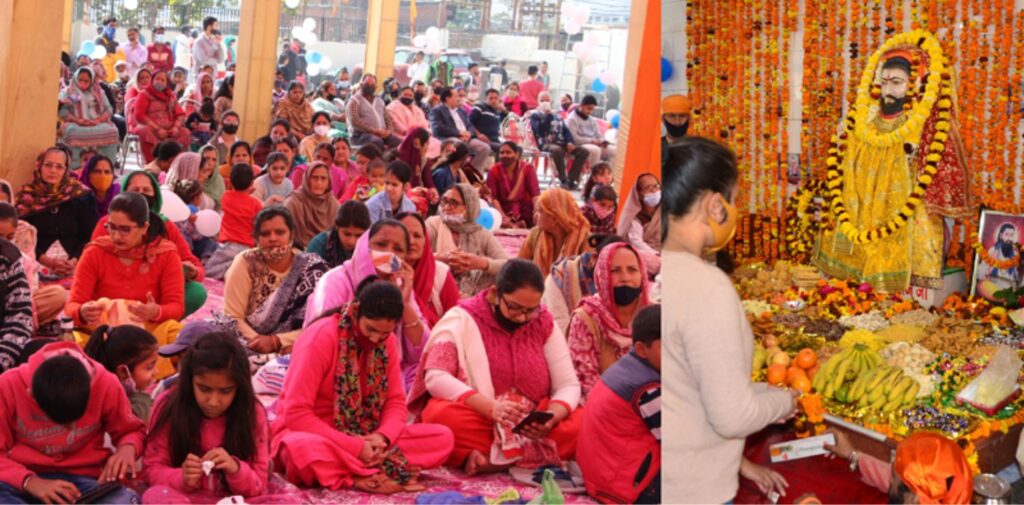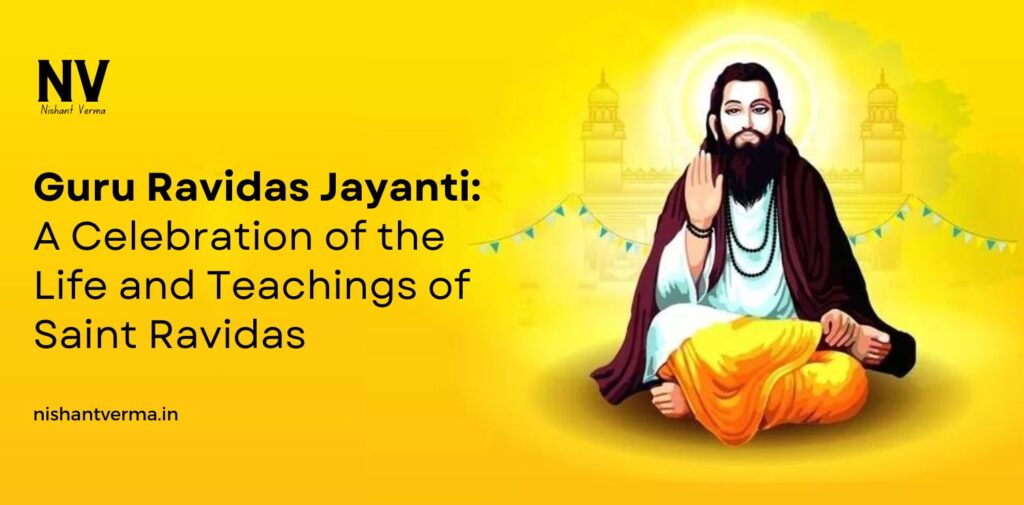Guru Ravidas Jayanti is a significant occasion for millions of followers of Saint Ravidas, a revered mystic poet-saint and social reformer. This day, celebrated with great fervor by his devotees across India and abroad, marks the birth anniversary of Guru Ravidas, who is considered a spiritual guide and a champion of social equality. Guru Ravidas Jayanti is not only a time for reverence and reflection but also an occasion to remember his teachings that emphasized love, compassion, equality, and the rejection of social hierarchies.
The Life of Guru Ravidas
Guru Ravidas was born in 1450 CE in the village of Seer Goverdhanpur, near Varanasi, Uttar Pradesh, India. He belonged to the ‘Chamar’ community, a low-caste group in the traditional caste system. Despite facing the hardships of being born into a marginalized community, Guru Ravidas rose above the limitations of caste and social norms to become a spiritual luminary. His life is a testament to his commitment to human dignity, equality, and the idea of unity among all people, regardless of their caste or background.
Though not much is known about his early life, it is believed that Guru Ravidas was drawn to spirituality from a young age. He was deeply influenced by the teachings of saints like Kabir and Nanak, who were contemporaries and propagated the idea of devotion to one supreme God, irrespective of caste, creed, or religion.
Guru Ravidas was a poet and a mystic, who composed hymns in the form of devotional songs. His poetry, written in the form of bhajans, resonated deeply with the common people, especially the downtrodden and oppressed sections of society. His hymns spoke of the futility of outward rituals and stressed the importance of inner devotion to God.
Guru Ravidas was an ardent believer in the concept of equality before God. He strongly rejected the caste system, advocating that true spirituality and devotion have nothing to do with one’s social or economic status. He often pointed out that one’s worth in the eyes of God is not determined by caste or social position but by the sincerity of one’s devotion and actions.

Teachings of Guru Ravidas
Guru Ravidas’s teachings were progressive and revolutionary for his time, especially in a society rigidly structured by the caste system. His philosophy stressed the unity of all human beings, regardless of their caste, creed, or social status. Some of his key teachings include:
1. Unity of God and Humanity
Guru Ravidas emphasized the unity of all beings in the eyes of God. He believed that there was one universal, formless, and eternal God, who transcended all distinctions of caste, race, and religion. His hymns often reflected this deep devotion to a singular divine entity, and he encouraged people to see God within themselves and in every living being. He promoted a sense of inner purity and devotion rather than external rituals.
2. Rejection of the Caste System
One of Guru Ravidas’s most significant contributions to Indian society was his rejection of the rigid caste hierarchy. In his hymns, he openly condemned the practice of untouchability and casteless society. He was one of the earliest spiritual leaders to challenge the established norms and promote social equality. His teachings urged people to recognize that their true identity was spiritual and not based on societal status.
3. Emphasis on Inner Purity
Guru Ravidas believed that spiritual purity did not depend on one’s external appearance or birth. He taught that true devotion to God came from within and was reflected in one’s actions, thoughts, and words. For him, the practice of love, compassion, and humility was the path to spiritual enlightenment.
4. Bhakti and Devotion
Guru Ravidas was a staunch proponent of Bhakti, the path of love and devotion to God. He believed that through sincere love for God, one could attain liberation (moksha). His hymns, filled with deep emotional expressions of devotion, have been passed down through generations and remain a source of inspiration for his followers.
5. Social Reform
Guru Ravidas was a social reformer who sought to address the social evils of his time. His message resonated with the downtrodden and those oppressed by the caste system. He not only challenged the social norms but also sought to uplift the marginalized sections of society. Guru Ravidas’s vision of a just society was based on love, equality, and compassion.

Guru Ravidas Jayanti: Celebrations and Significance
Guru Ravidas Jayanti is celebrated annually, usually in the month of February, on the full moon day (Purnima) of the Magha month, according to the Hindu calendar. This day holds immense significance for his followers, as it is a reminder of the saint’s teachings and his lifelong fight for equality, justice, and the well-being of all people.
1. Rituals and Ceremonies
On Guru Ravidas Jayanti, devotees gather in large numbers at Ravidas temples and Gurudwaras, especially in regions like Punjab, Uttar Pradesh, Rajasthan, and Haryana. Special prayers, devotional songs, and kirtans are held to commemorate his life and teachings. Devotees sing the hymns composed by Guru Ravidas, known as the Shabads or Bhajans, which carry deep spiritual significance.
In addition to prayers, processions are carried out in many places, with people singing devotional songs and carrying flags bearing the image of Guru Ravidas. The streets are often decorated with flowers and colorful banners, and devotees from all walks of life join in the celebrations. Some regions also conduct community feasts (Langar), where food is served to all, irrespective of caste or social status, symbolizing the spirit of equality and service.
2. Spiritual Reflection and Learning
For many, Guru Ravidas Jayanti is a day of spiritual reflection. Followers take the time to read and meditate on the hymns of Guru Ravidas, seeking guidance and inspiration in their daily lives. The day is also used for social gatherings, where people come together to discuss the teachings of Guru Ravidas, and how they can apply them in modern life to promote social harmony and equality.
3. Social Impact and Legacy
The legacy of Guru Ravidas extends far beyond the confines of religious practices. His teachings on social justice, equality, and the importance of human dignity continue to inspire countless individuals and social movements, particularly those working to uplift marginalized communities. In recent years, many social organizations, especially those belonging to the Dalit community, have used Guru Ravidas Jayanti as an opportunity to draw attention to the ongoing fight against discrimination, caste-based violence, and inequality in society.
Guru Ravidas Jayanti is not only a time to celebrate the life of a great spiritual leader but also an occasion to renew the commitment to the values he espoused. His message of love, unity, and social reform continues to be relevant in today’s world, where divisions based on caste, religion, and ethnicity still persist.

Conclusion
Guru Ravidas Jayanti is a day of immense significance for millions of people around the world. It is a day to remember and honor the life and teachings of a saint who dedicated his life to spreading love, equality, and the pursuit of truth. Guru Ravidas’s message of devotion to one God, rejection of caste distinctions, and promotion of social equality remains an enduring beacon of hope and inspiration.
As the world continues to grapple with issues of inequality and discrimination, the teachings of Guru Ravidas provide a timeless blueprint for creating a more just and compassionate society. By observing Guru Ravidas Jayanti with reverence and devotion, his followers not only pay tribute to his memory but also pledge to carry forward his mission of love, equality, and social reform.




